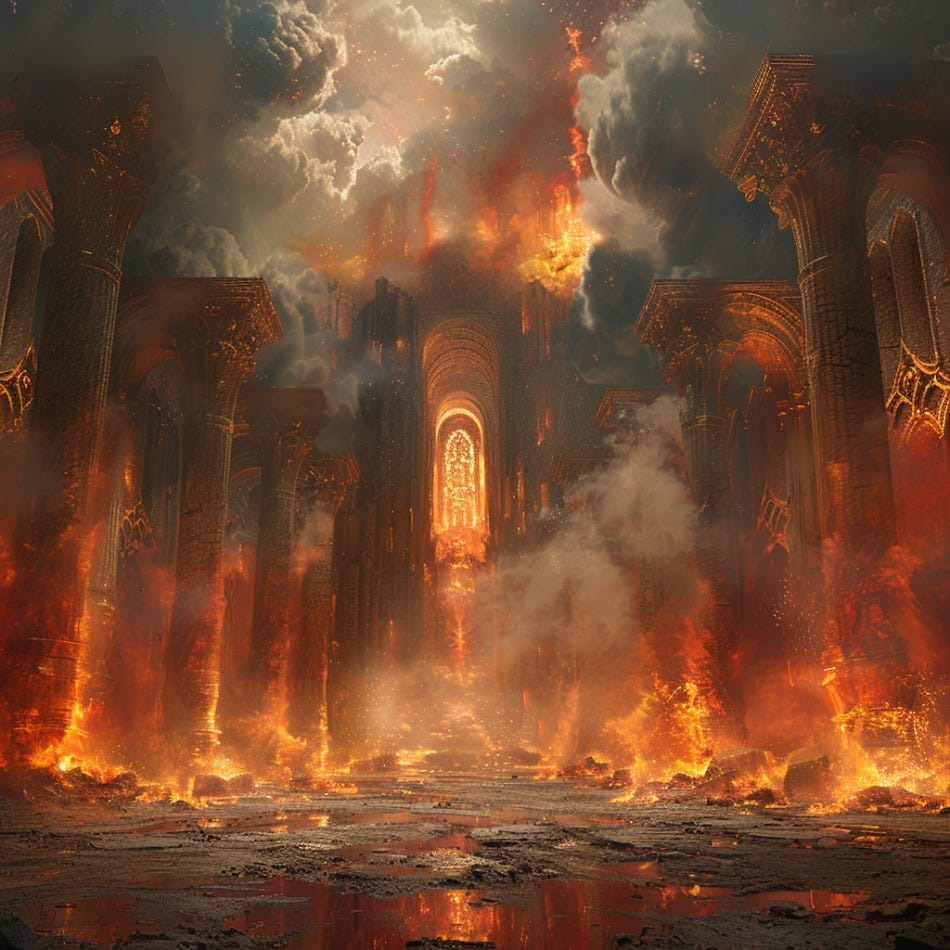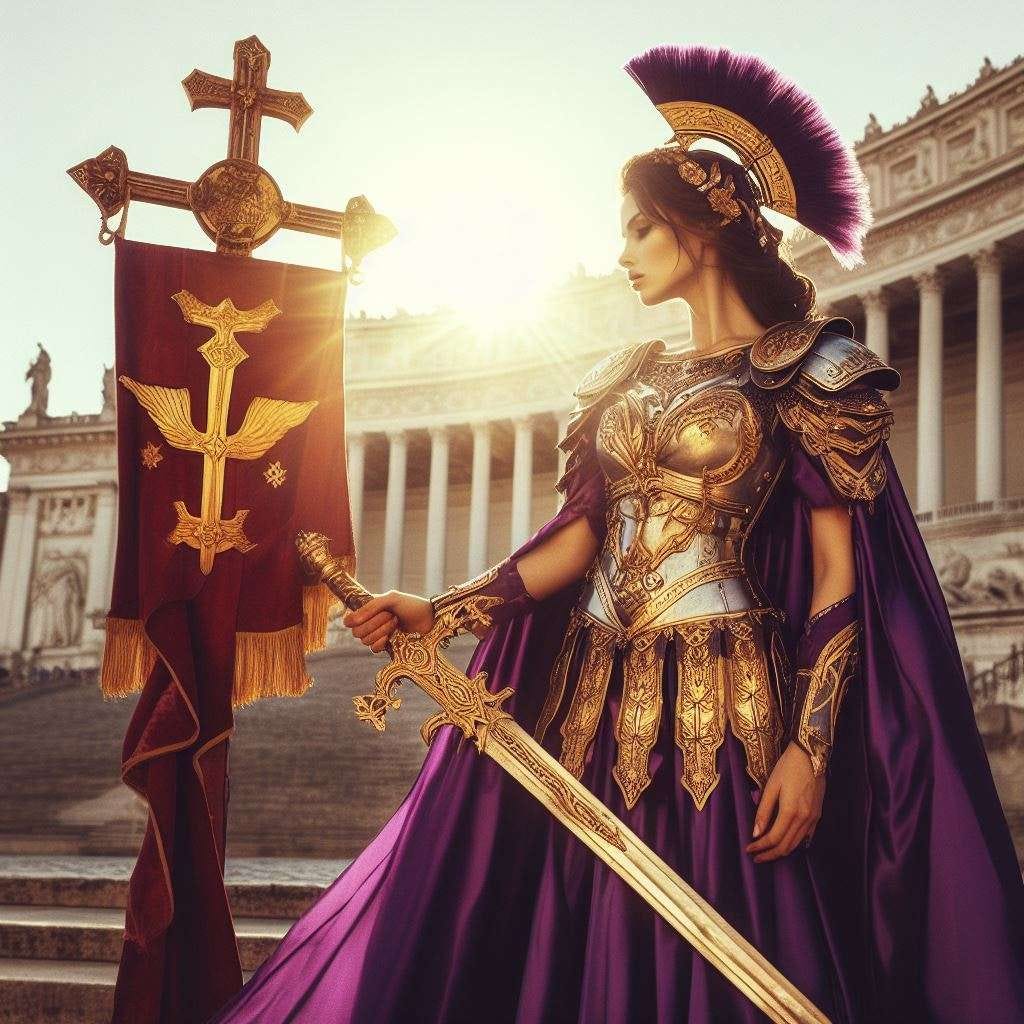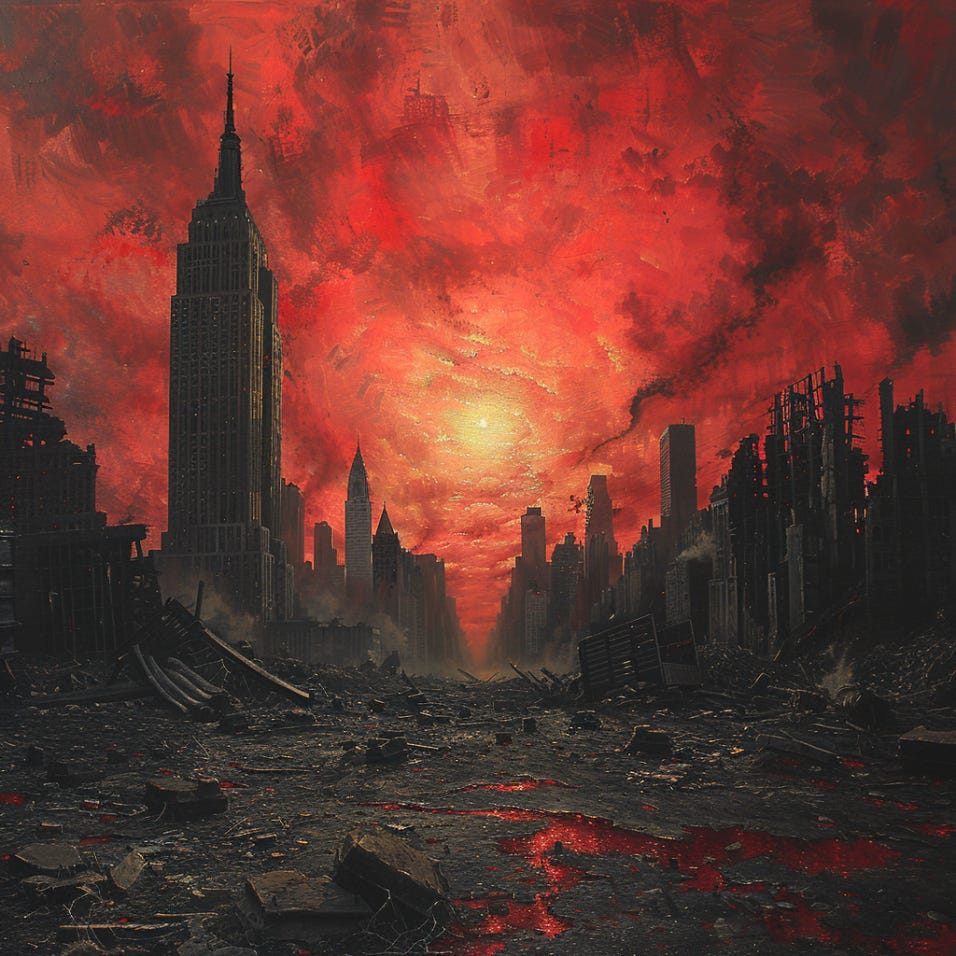Intermission: A Most Woeful Epic of Alakyrum
The Contemplator of the Tree of Woe graces us with his Magnificent, Woeful Prose
The DOOM Furnace, Soft Illumination, Muted Whispers, Cataclysmic Power, Essential, Interconnected.
The most wonderful Contemplator of The
, Pater himself… has graced us with his presence for today's special Guest Post!I, your friendly, neighbourhood DOOM Merchant, am deeply honoured by this gesture, where Pater has chosen to simul-post this superb Poetic Gem to The Fall of The West & Contemplations on the Tree of Woe for all to read!
I requested around ~600 words or so to embellish this masterpiece, & so (without further ado) I shall do so! I felt it my duty & obligation, considering its Magnificence! In the meantime, head to
to read the original submission!These days, it is normal for poetry to be viewed as something merely for the 'intelligentsia' of society to dabble & engage in. As for the rest of the masses? Too much conspicuous consumption dulls them to this art form & all of its sundry profundities:
However, there are glimpses of poetry's 'pull on the heartstrings of Man' that occasionally shine, even in our exceptionally decadent times. The Hadith literature, when speaking about the Good in poetry, is apparent on said matter & explicitly notes:
وَ إِنَّ مِنَ الشِّعْرِ لَحِکْمَةً وَاِنَّ مِنَ الْبَیَانِ لَسِحْرًا
Indeed, in poetry there is wisdom and in eloquence there is magic.
Hadith 19, 40 Hadith Shah Waliullah
I am of the unyielding view that ‘Alakyrum’ by
firmly occupies said position whereby magic, eloquence & wisdom all shine through:Prima Facie it speaks about the friendship & camaraderie among men, & the tragedy that befalls two friends who find themselves foes & mortal enemies on the battlefield.
However, it is much more than just that:
We can view the epic as a silent condemnation of the vile 'Elite' of the time, who are so engrossed in their wanton trifles of empire-building & expansion that they bring to ruin everything they touch, & this trickles down to the most fundamental level:
Ultimately, Civilization is the story of individual Men & their friendships (& enmities) with one another. When these core relationships are corrupted, trifled with or just put to the wayside as 'irrelevant,' tragedy becomes commonplace.
As many of the Ancients put it, Justice is to 'put things in their right place.' Yet when reading 'Alakyrum,' even the more hasty reader will note intuitively that things are not only in their proper place but are likewise deeply troubling & 'wrong:'
It *should not* be the case that one takes up arms against childhood friends. It *should not* be the case that so many men die for such trifles. It *should not* be that there be such carnage & brutality on the battlefield... & so on.
Why is it that, despite the exceptional 'attention-deficit'- prone societies many of us today inhabit, the common eye still has such a fine eye for detail, which gets to the heart of the matter? Is there a specific reason for this state of affairs?
Perhaps this has more to do with the Zeitgeist we inhabit, one in which many lives have been lost through pointless overseas wars?
Perhaps it is more the universal allure of epic prose, whereby the Human Eye can effortlessly grasp specific motifs?
Perhaps Pater
& his ‘Alakyrum’ is simply that excellent?Given my DOOM Merchant proclivity to always answer 'All of the Above!' to most queries, I shall also do so here! That said, I strongly tend toward affirming the extreme latter & am in awe at the sundry topical & thematic undertones that ‘Alakyrum’ illuminates!
The embellishment is warranted, for what you will now read, Dear Readers, will make you examine firsthand all the undertones, bringing to life the wisdom, magic & eloquence of times old & new! & now, I give the floor to Pater
!Historically, poetry has been ranked among the highest art forms of Western civilization. That is not the case today, except perhaps in the field of rap where a form of spoken poetry with rhyme and meter is still worthy of respect.1 But even the finest raps cannot compare to the great poetry of the past, poems that moved a man’s soul to war, love, triumph, and tragedy.
I don’t talk much about my career as a game designer and fiction writer here. It’s my primary source of income, and I write millions of words per year. However, I have not written poetry for my games or comics. Or, rather, I had not. About a year ago, a poem arrived in my mind, virtually complete, as if channeled by some external force. I have not shared it with many people, but a few of my close associates have recommended that I do so, as part of the rising “Art Right” movement (so named by its chief proponent,
). In any case, the themes of the poem very much reflect the themes of this blog.The poem is set in a fictional world called the Auran Empire. Some of the words are from a constructed language spoken by the Aurans. You can download a primer on the Auran tongue here if you’d like. The words in the poem are pronounced approximately as follows:
Alakyrum (“city of sacred war”): Ah-lah-KIE-rum.
Ammas Aurë (“serene sea”): AW-mahs Are-ay
Audarian (“of the morning light”): Aw-DARE-ee-ahn
Auran (“of dawn”): AW-rehn
Bellësyre (“sword of fire”): Bell-AY-sire
Opelenea (“majestic land”): OH-pa-lehn-ee-ay
Parthalan: Par-THA-lahn 2
Tarkaun (“emperor”, literally “big bird”): Tar-kahn3
Tirenea (“crown land”): Tear-EHN-ee-ay
Without further ado, the poem.
Alakyrum
Ten thousand men-at-arms a-marched,
O'er mountains grim and deserts parched
From the vales of great Tirenea
To the lands of Opelenea,
Where on the salt-encrusted sands,
Alakyrum, in its splendor, stands.
Purpled were that city's walls,
Like heaven's hue when sunset falls,
From which it flew, in proud rem’brance
Of victories won, those knightly pennants
That had been born in bronze array
In battles 'cross the Ammas Aurë.
Ten thousand men came to a halt
In that land of sand and salt.
They marshaled arms before the wall,
And dared demand those pennants fall!
"Alakyrum! Desert jewel -
Our Tarkaun does your demesne rule."
In answer to the Tarkaun's claim,
The city's bowmen set their aim--
And flights of arrows fletch'd in black
Came at the Aurans in attack.
A thousand perished in that rain--
Nine thousand more still stood unslain.
Nine thousand then took up their shields,
And strode across those bloody fields.
The cadence of their sandaled tread
While stepping o’er one thousand dead
Missed not a mark, slowed not a beat.
No man fell back, nor thought retreat.
Those proud pen’nts! Those purpled walls!
Those sun-swept spires and stately halls!
So high, so tall, so fine and grand--
They’d see them tumbled to the sand.
Their jaws were set, their faces grim,
As they fell on Alakyrum.
Nine thousand men, void of pity,
Had vowed that they’d destroy the city.
They battered rams against its gate
And called for blood, insatiate.
Though mangonel and trebuchet
Hurled stone from sky at them all day,
Mangling bone and shatt’ring skull,
The Aurans forayed without lull.
With sword they struck bronze panoply,
And made such loud cacophony
That those within the citadel
With hearing knew of coming Hell.
Eight thousand men made breach the gate,
Led at the van by their Legate,
That noble-born patrisien,
The val’rous lord Audarian.
The Legate wielded Bellësyre
(Which means, in Auran, “sword of fire”).
Now cleaving left, now hewing right,
‘Til all before him broke in flight.
“By this or’chalcum falx,” he cried,
“A hundred foes of ours have died!
By more such deeds, we’ll win the siege.
Press on, press on, outdo your liege!”
Six thousand men pressed on and on,
Debouching to a verdant lawn
Upon whose lush and watered fields,
Had formed in phalanx, locking shields,
The champions of that splendid town.
And to their fore, in gleaming crown
Came the king of Alakyrum.
When he began to sing a hymn,
The Legate knew him! “Parthalan,
Friend of mine in childhood gone,
Why did you not surrender to
Our Tarkaun’s sovereign claim on you?”
Six thousand men, hoplites devout,
Stood at the ready to find out.
“Audarian, my oldest friend,
’Tis well to see you ‘fore the end.
By skill and luck I gained command
Of this city of salt and sand.
But when they made me king and lord,
They made me swear upon my sword
That never would I bend my knee
To Aura’s golden tyranny.
The oath I’ve sworn I will not break.
So we must fight though my heart ache.”
Six thousand men who knew no fear
Charged shield to shield and spear to spear
And in the melee’s first foray,
Another thousand passed away.
Shields were splintered and swords were dull,
And combat slipped into a lull.
Five thousand men fell back, regrouped,
And in their second charge recouped
The deaths they’d suffered in excess.
But still there were a thousand less
To carry on the savage fight
As it went on into the night.
Four thousand men were painted red
From blood that pooled by mounds of dead.
Above the field in dark’ning skies,
Fell crows gathered to dying cries
Of countless fallen friend and foe
Whose dreams of glory came to woe.
And grim was Lord Audarian
To see good men made carrion.
But Auran eagles never yield
While any man still bears his shield.
And so he called out to his friend,
“Let’s bring this battle to its end.”
Four thousand men now stood aside
To let by duel their lord decide
Whether this day’s sacrifice
Would in the eyes of gods suffice
To satisfy the Tarkaun’s claim
To rule this city of marveled fame.
King Parthalan with stately step
And smiling face and eyes that wept
Approached legate Audarian,
And one last time embraced his friend.
“When Tarkaun tried to claim my land,
I hoped that you’d be in command.”
Two men, though friends in sentiment,
The legate of a regiment,
And monarch of a polity,
Were set at odds by destiny.
Audarian, his falx aflame,
King Parthalan, first of his name,
Each struck down his dearest friend
And brought a valiant life to end.
Now in that land of salt and sand,
Where old friends took their final stand,
The salt is tears, the sand is mud,
Where like brothers they mingled blood.
I hope this poem moved you. Thanks for reading.
1 I once dated an MFA who asked me who I thought the best poet in the world was. When I sad Eminem, she broke up with me.
2 Parthalan is from a dialect of Somirea, in the Sunset Kingdoms, and isn’t Auran.
3 The word itself was inspired by the phonology of Archon, Khan, and Grand Moff Tarkin. In the Auran Empire, Tarkaun literally means “big bird”, which is a kenning for “eagle.” The eagle was the battle standard of the warrior-noble who established the Empire, who adopted Tarkaun as his sobriquet. Because of his fame, the term later became the word for emperor.
Your support is vital for Smelting the DOOM; & keeping it HOT & FRESH off the Furnace!
If you enjoyed the read, I would greatly appreciate it if you subscribed to a Monthly or Yearly pledge to support my work so that I may continue Smelting DOOM for your displeasure!
Alternatively, you can tip here:
Thank You, Dear Reader(s), for all your support!









Wonderful poem, and I'll comment here as I'm unable to over at Tree of Woe (sorry, poor and can't water the Tree properly!).
I enjoyed it not even taking the time to apply the translations provided - the poem is well written enough to get the gist of it without it. I'm sure it's better if I was able to hold them in my head, but I'm not, and I didn't want to lose the flow of the meter by breaking it to translate. Hat off to being able to pull that off.
It speaks well that you're able to pull off and create characters that one can empathize with on both sides of the conflict. Not knowing the history, I couldn't speak on if the one invading is just or not - certainly the one defending his home is! But, we in the West, who like to paint with brushes of black and white, forget the moral grey areas - that not every soldier is culpable (morally) for even the wars within which they fight. They don't know the lies behind the propaganda or may be deceived. While I find our wars completely unjust in the Middle East, and they're coming back to haunt the US, I doubt that all of our soldiers have those sins weighing upon their souls, and were torn as they found themselves fighting people they had befriended at various times during deployments.
Finally - the commentary that proceeded the poem that I think applies to today. What does the Empire do to us? Does it make us enemies by fate as it seeks to divide and conquer us? I know I feel it does! Both in society at large, and even, at times, within my own community as we purge ourselves of the broader values. I have people I'm close to, that I would (at times) have gotten in fights with because they pursued the gains of the Empire over friendship and community. The demons tear at us, and we must drive them out with swords of flame should we home to win!
Well done.
I skipped the preliminary word list, and almost skipped the poem itself because of it, but I'm glad I persisted. And I got all the pronunciations and meanings from the rhyme and context.
I'm not sure if the Contemplator will read this (it comes a bit late, and like others, I'm unable to comment at Tree of Woe), but I would like to suggest that he checks out the traditional alliterative meter. This was used by Tolkien and C.S. Lewis and works very well for narrative poetry. And at least one revivalist (Paul Deane at Forgotten Ground Regained) began using it precisely because he was involved in fictional worldbuilding.